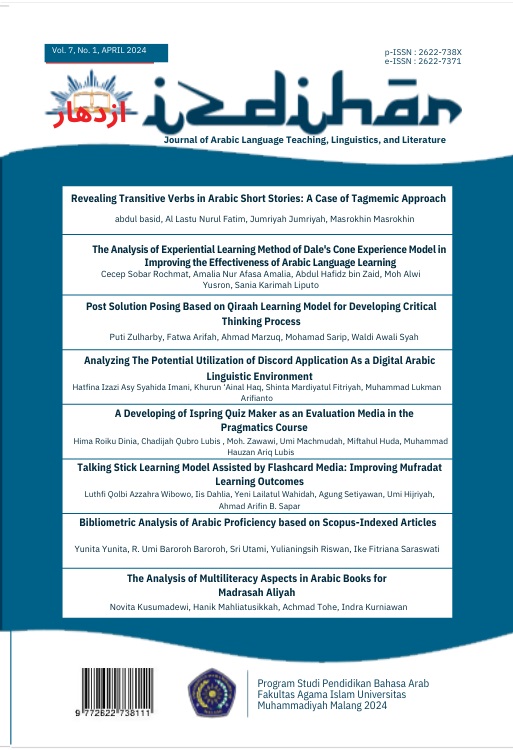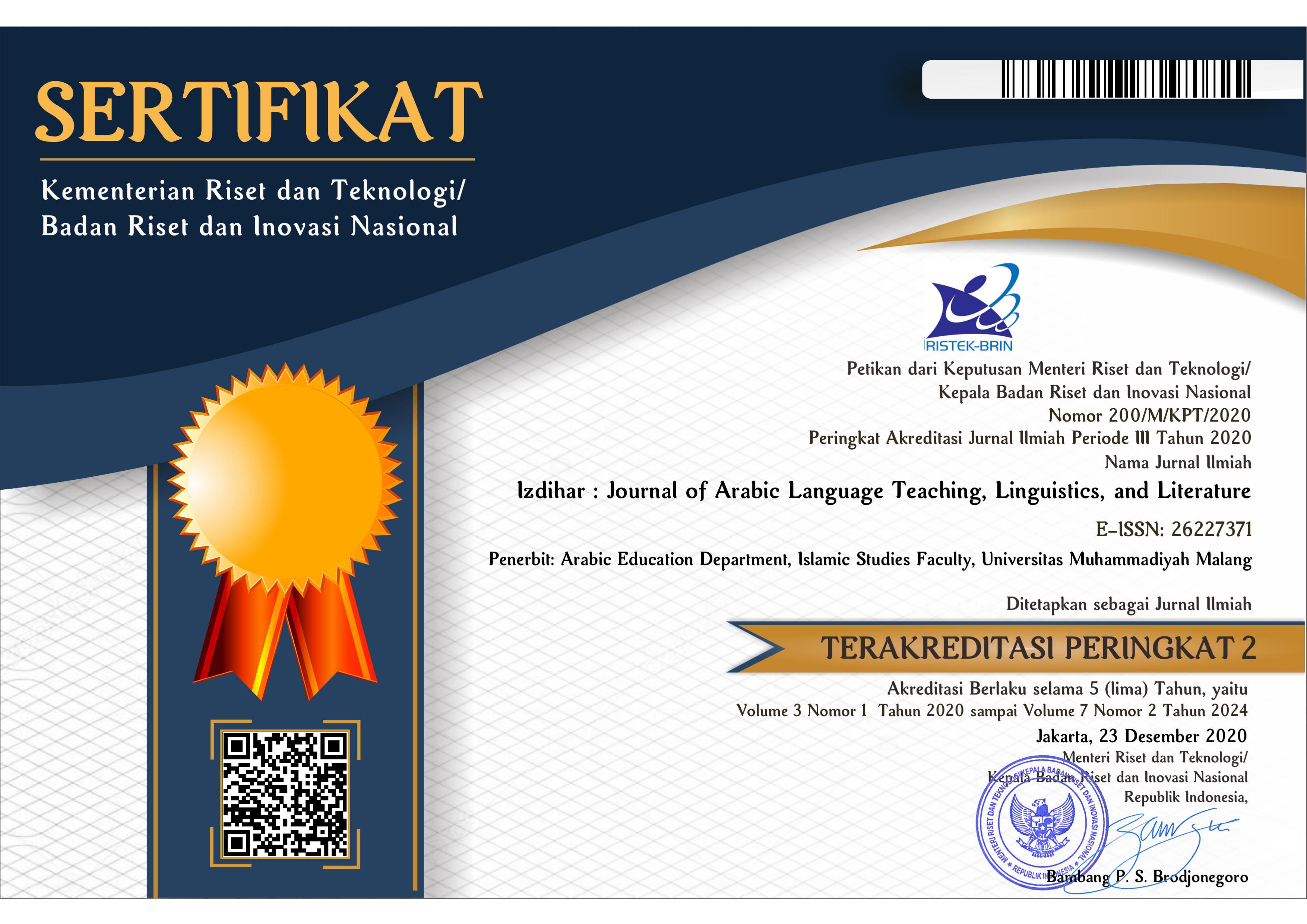Analyzing The Potential Utilization of Discord Application As A Digital Arabic Linguistic Environment
DOI:
https://doi.org/10.22219/jiz.v7i1.28348Keywords:
Discord application, Digital linguistic environment, Arabic linguistic environmentAbstract
The purpose of this study was to present a new concept in viewing the Discord application by comparing the concept of the language environment with the use of Discord as a language learning medium. This research used exploratory qualitative research using a grounded theory approach and in-depth studies regarding the concepts and theories needed. Data are collected by direct observation on one of the Arabic learning servers, namely the Learn Arabic server, and questionnaires. The results of the data analysis showed that the activities on the Discord server indicate new possibilities in using the Discord application as a digital Arabic linguistic environment. The practical implication of this research is to raise awareness among educators and Arabic students about the value of the Discord application as a language learning medium.
Downloads
References
Arifianto, M., & Izzudin, I. (2021). Students' Acceptance of Discord as an Alternative Online Learning Media. Int. J. Emerg. Technol. Learn., 16. https://doi.org/10.3991/ijet.v16i20.22917
Astuti, R., Akla, A., & Sarbaini, A. (2020). Strategi Pembentukan Lingkungan Berbahasa Arab di Madrasah Aliyah. An Nabighoh, 22 (01), 17-36. https://doi.org/10.32332/an-nabighoh.v22i01.2075
Awwaludin, Muhammad; Malik, Stevan & Siswanto, Nopri Dwi. (2020). Pembentukan Lingkungan Bahasa Arab dalam Meningkatkan Penguasaan Bahasa Arab pada Pesantren Bahasa Arab (MIM LAM). Definisi: Jurnal Agama dan Sosial-Humaniora, 1(1): p 55–64. http://dx.doi.org/10.1557/djash.v1i1.16716
Ayob, M., Hadi, N., Pahroraji, M., Ismail, B., & Saaid, M. (2022). Promoting 'Discord' as a Platform for Learning Engagement during Covid-19 Pandemic. Asian Journal of University Education. https://doi.org/10.24191/ajue.v18i3.18953
Ceci, L. (2023, March 8). Discord - Statistics & Facts. Statista. Retrieved April 18, 2023, from https://www.statista.com/topics/9816/discord/#topicOverview
Crick, T., Knight, C., Watermeyer, R., & Goodall, J. (2021, March). An overview of the impact of COVID-19 and" emergency remote teaching" on international CS education practitioners. In Proceedings of the 52nd ACM Technical Symposium on Computer Science Education (pp. 1288-1288). https://doi.org/10.1145/3408877.3439680
Effendy, A. F. (2012) Metodologi Pembelajaran Bahasa Arab. Malang: Misykat.
Efriani, E., Dewantara, J., & Afandi, A. (2020). Pemanfaatan Aplikasi Discord sebagai Media Pembelajaran Online. Jurnal Teknologi Informasi Dan Pendidikan, 13(1), 61-65. https://doi.org/10.24036/tip.v13i1.283
Gama, K., Zimmerle, C., & Rossi, P. (2021). Online Hackathons as an Engaging Tool to Promote Group Work in Emergency Remote Learning. Proceedings of the 26th ACM Conference on Innovation and Technology in Computer Science Education V. 1. https://doi.org/10.1145/3430665.3456312
Habibah, N. (2016). Lingkungan artifisial dalam pembelajaran bahasa Arab. Arabiyat: Jurnal Pendidikan Bahasa Arab dan Kebahasaaraban, 3(2), 173-196. http://dx.doi.org/10.15408/a.v3i2.4038
Hidayat, A. (2012). Bi’ah lughowiyah (lingkungan berbahasa) dan pemerolehan bahasa (Tinjauan tentang Urgensi Lingkungan Berbahasa dalam Pemerolehan Bahasa). An-Nida', 37(1), 35-44. https://www.academia.edu/download/52458633/311-591-1-SM.pdf
Hidayat, M. A., & Mufidah, N. (2022). Strategi Manajemen Kontrol Bi’ah Arabiah Di Pp Darul Lughah Waddirasatil Ilmiyah Pamekasan. Lahjah Arabiyah: Jurnal Bahasa Arab dan Pendidikan Bahasa Arab, 3(1), 46-54. https://doi.org/10.35316/lahjah.v3i1.46-54
Jannah, E. I., & Hentasmaka, D. (2021). The Use Of Discord Application In Virtual English Learning: An Investigation On Students Perceptions. Premise: Journal of English Education and Applied Linguistics, 10(2), 183-200. http://dx.doi.org/10.24127/pj.v10i2.4168
Joseph, J., Anilkumar, A., Thomas, T., & S, B. (2022). Discord: An all in one messaging application (Case Study). international journal of engineering technology and management sciences. https://doi.org/10.46647/ijetms.2022.v06i05.067
Kennedy, T. J., & Lingard, L. A. (2006). Making sense of grounded theory in medical education. Medical education, 40(2), 101-108. https://doi.org/10.1111/j.1365-2929.2005.02378.x
Kusnedi, Y. S. (2020). Implementasi Problem Based Learning Berbantuan Aplikasi Discord Sebagai Upaya Peningkatan Hasil Belajar Komputer dan Jaringan Dasar Materi Sistem Operasi Pada Siswa Kelas X TKJ SMKN 2 Sampit. Penelitian Tindakan Kelas Program Pendidikan Profesi Guru (PPG) Universitas Negeri Malang. https://sharingrpp.com/pdf/42046/penelitian-tindakan-kelas.pdf
Li, Y., Sears, N.A., Murray, I.V., & Yadav, K.K. (2021). Rethinking Teaching Team-Based Learning: The Challenges and Strategies for Medical Education in a Pandemic. AERA Open, 7. https://doi.org/10.1177/23328584211067207
Marco, L. (2021). User-centered evaluation of Discord in midwifery education during the COVID-19 pandemic: Analysis of the adaptation of the tool to student needs. European Journal of Midwifery, 5. https://doi.org/10.18332/ejm/142638
Merbawani, G. W. (2022). Debaters perspective toward the use of Autonomous Learning. IJET (Indonesian Journal of English Teaching), 11(1), 18-29. https://doi.org/10.15642/ijet2.2022.11.1.18-29
Odinokaya, M. A., Krylova, E. A., Rubtsova, A. V., & Almazova, N. I. (2021). Using the discord application to facilitate EFL vocabulary acquisition. Education Sciences, 11(9), 470. https://doi.org/10.3390/educsci11090470
Purba, A. (2014). Peranan lingkungan bahasa dalam pemerolehan bahasa kedua. Pena: Jurnal Pendidikan Bahasa dan Sastra, 2(2). Retrieved from https://online-journal.unja.ac.id/pena/article/view/1447
Putri, N. N., & Sastromihardjo, A. (2021). Peran Aplikasi Discord dalam Pembelajaran Berbicara. In Seminar Internasional Riksa Bahasa (pp. 191-196). http://proceedings.upi.edu/index.php/riksabahasa/article/download/1676/1526.
Rachmawati, Y., Ma’arif, M., Fadhillah, N., Inayah, N., Ummah, K., Siregar, M. N. F., Amalyaningsih, R., Aftannailah, F., & Auliyah, A. (2020). Studi Eksplorasi Pembelajaran Pendidikan IPA Saat Masa Pandemi COVID-19 Di UIN Sunan Ampel Surabaya. Indonesian Journal of Science Learning (IJSL), 1(1), 32–36. https://doi.org/10.15642/ijsl.v1i1.633
Ramadhan, A. (2021). Student's response toward utilizing discord application as an online learning media in learning speaking at senior high school. ISLLAC: Journal of Intensive Studies on Language, Literature, Art, and Culture, 5(1), 42-47. http://dx.doi.org/10.17977/um006v5i12021p42-47
Shidqi, M. H., & Mudinillah, A. (2021). Pembelajaran Bahasa arab dengan memanfaatkan lingkungan berbahasa bagi mahasiswa di Perguruan Tinggi. Jurnal Education and development, 9(3), 170-176. https://doi.org/10.37081/ed.v9i3.2807
Teng, L., & Zhang, L. (2021). Can Self-Regulation be Transferred to Second/Foreign Language Learning and Teaching? Current Status, Controversies, and Futures Directions. Applied Linguistics. https://doi.org/10.1093/applin/amab032
Tsegay, S., Ashraf, M., Perveen, S., & Zegergish, M. (2022). Online Teaching during COVID-19 Pandemic: Teachers' Experiences from a Chinese University. Sustainability. https://doi.org/10.3390/su14010568.
Unsi, B. T. (2015). Kemahiran berbicara Bahasa Arab melalui penciptaan lingkungan bahasa. Tafáqquh: Jurnal Penelitian Dan Kajian Keislaman, 3(1), 123-141. https://doi.org/10.52431/tafaqquh.v3i1.42
Wahyuningsih, E., & Baidi, B. (2021). Scrutinizing the potential use of Discord application as a digital platform amidst emergency remote learning. https://doi.org/10.22515/jemin.v1i1.3448
Zannah, N., Z., & Fatnah, N. (2022). Examining the Use of Discord Applications in Improving Science Learning Outcomes of Grade 7 Students. International Journal of Education and Humanities. https://doi.org/10.58557/ijeh.v2i2.84
Downloads
Published
How to Cite
Issue
Section
License
Copyright (c) 2024 Hatfina Izazi Asy Syahida Imani, Khurun ‘Ainal Haq, Shinta Mardiyatul Fitriyah, Muhammad Lukman Arifianto

This work is licensed under a Creative Commons Attribution-ShareAlike 4.0 International License.
Copyright Notice
Authors who publish with this journal agree to the following terms:
- Authors retain copyright and grant the journal right of first publication with the work simultaneously licensed under a Creative Commons Attribution-ShareAlike 4.0 International License that allows others to share the work with an acknowledgment of the work's authorship and initial publication in this journal.
- Authors are able to enter into separate, additional contractual arrangements for the non-exclusive distribution of the journal's published version of the work (e.g., post it to an institutional repository or publish it in a book), with an acknowledgment of its initial publication in this journal.
- Authors are permitted and encouraged to post their work online (e.g., in institutional repositories or on their website) prior to and during the submission process, as it can lead to productive exchanges, as well as earlier and greater citation of published work (See The Effect of Open Access).
Copyright (c) 2019 Izdihar : Journal of Arabic Language Teaching, Linguistics, and Literature

This work is licensed under a Creative Commons Attribution-ShareAlike 4.0 International License.


















